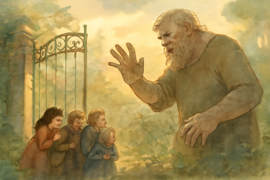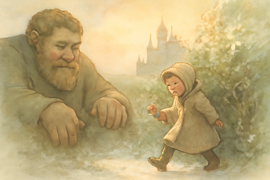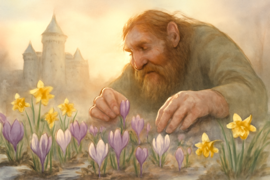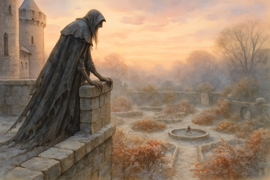Introduction
High on a craggy hillbook in the west of Ireland stood a lonely castle, its walls ringed by a vast and wondrous garden. For years, the garden greeted dawn with a chorus of birds and welcomed children from the nearby village, who raced through its winding pathways, chased butterflies over sunlit lawns, and lay in fields of daisies until twilight summoned them home. Yet, one bitter day, the castle’s master returned—an enormous giant with a heart as cold and unyielding as the limestone ramparts he strode upon. With a booming voice that echoed across the valley, he banished the laughing children from his beloved grove and drove them away with swinging fists and furious threats. He built a towering wall around the garden, affixing a warning sign that bore his slanted handwriting: “Trespassers will be punished.”
Seasons shifted without protest; summer’s lush greens faded into the bright reds of autumn, and autumn in turn gave way to winter’s silent hush. Inside the walled garden, nothing but frost-kissed grass and wilting bushes remained under a sky that threatened snow at any moment. The giant himself grew restless, pacing among thorny bramble and broken branches, longing for the laughter he had silenced yet unwilling to admit he missed it most of all. Day after day, he watched the stone courtyard, wondering if the children who once raced past his feet would ever return.
The Giant’s Forbidden Garden
The giant’s garden, once a realm of spontaneous delight, had fallen silent.

The first spring after the wall went up arrived without fanfare. Tattered remnants of daisies poked through damp soil, and curious crocuses braved the chill. Yet no small voices answered the rustle of emerging leaves. Instead, an oppressive hush lingered around the stone archway, as though the garden itself had grown ashamed. The giant strode among crooked box hedges that scraped his knees and pressed his palm against the rough bark of an ancient apple tree. He felt its pulse, its eagerness to bear blossoms again, and he wrenched his hand away in frustration. “These trees will bloom only for me, and only when I command them to,” he rumbled to himself.
Below him, village children clustered against the gate, staring with wide eyes at the forbidding walls. They told tales of the giant’s temper and the swift crack of his whip whenever they dared approach. At dusk, embers of their fear glowed in lantern light as they crept home, cheeks flushed by remembered laughter and hurried steps. None believed his heart could ever soften; none dared imagine a day when he would welcome them back.
Days lengthened into weeks. The giant, convinced of his own strength, watched each new sprout with keen suspicion. If a tulip dared break through thawing earth, he uprooted it in fury. If a robin dared to sing from a branch, he chased it off with an angry roar. He believed kindness was weakness, and he protected his solitude with clenched fists and a thunderous voice, failing to see that every moment of anger carved deeper cracks in the garden’s once-living spirit.
By midsummer, the soil lay cracked and parched, and the hedges bore no fruit. The giant stood alone amid skeletal stems and barren beds, and the silence he had fought for weighed heavily against his ribs. For the first time, he wondered what it might be like to hear children’s laughter once more—but in the next breath, he silenced that thought, whispering, “No. They have no place here.”
A Child’s Gentle Heart
One frost-laden morning, the giant returned to the garden and found the gate ajar. The wind had blown it loose, or so he claimed, but what he discovered inside gave him pause. Snow lay thick across grassy paths, and frost encrusted the roses until each petal looked like spun sugar. In the corner nearest the gate, he spied a single child, bundled in wool, kneeling beside a stone fountain now iced solid. In her small hand was a spray of pink blossoms—the first flowers he had not ripped from the earth with his own hands.

"What are you doing here?" the giant boomed, voice echoing like hail against slate. The child looked up, large eyes shining with quiet wonder. "I have come back to see the garden," she told him simply. "You shut us out, but one rose grew for me, and I carried it here for you."
The giant felt a curious tug at his chest, like a cold wind stirring embers in a hearth long thought dead. He reached to seize the flowers—and stopped. The child’s hand did not tremble. Instead, she placed the petals gently upon the ice and whispered, "Spring will come again, but only if we believe it can."
Night fell as the giant stood in that frozen courtyard, astonished by the child’s fearlessness and compassion. He expected her to flee, to pray for mercy, or to cry in terror. Instead, she greeted his roar with unshaken calm, and her presence warmed the chill air. He found his anger drained away, leaving only confusion and a hesitance he had never known. When dawn broke, he left the child and returned to the house without raising his whip.
In the days that followed, he dared to wander near the gate again. Each morning he found the child in the same spot, waiting patiently with another blossom. One day it was a violet, another day a crocus, and soon the garden ice began to crack under their gentle weight. Though he did not speak, the giant listened. He watched the buds swell, watched the frost relent, and understood at last that he’d been the only winter left within these walls.
Awakening Spring Through Love
As the giant observed, tender green shoots emerged where icy petals once lay. The child’s daily offerings coaxed life from exhausted earth: primroses unfurled, daisies spread their white wings, and weeds that once threatened to choke the garden now chipped away at winter’s grip. Each bud was a quiet triumph, and the giant felt the stirrings of a long-forgotten wonder. Yet old habits died hard. He still debated whether to bar children forever or to risk pain by reopening his gates.

One dawn, he noticed the child had not come. The garden was silent, chilled by a lingering frost. Panic rooted him to the spot. Hours passed, and the sun climbed toward high sky, but she did not appear. The giant, in a way he had never known, feared for her safety. He searched every hedge and peered behind every rosebush until, in a circle of fresh daffodils, he found her—pulled up by the roots, knocked to the ground, her small frame trembling as snow slashed at her coat. Without thinking, the giant swept aside the thorny branches that had crushed her, scooped her up in enormous hands, and carried her back into his home, wrapping her in blankets and warming her with gentle breaths.
When she opened her eyes, the giant saw not fear but trust shining in her gaze, and something cracked wide open within him. Through her quiet courage he recognized his own cruelty, and remorse flooded a heart that had forgotten its capacity to feel. With trembling voice, he apologized for every moment of hatred and promised he would never snap at a child again. The little girl only smiled, offering him a single daisy—no words needed.
The next morning, the garden gates stood open for every child in the village. Laughter returned to the winding paths like a long-lost friend, and wildflowers sprang up everywhere children danced. The giant watched with tears that felt as bright and warm as sunshine, leaning on a mossy wall to soak in the joyous uproar. That day, spring truly came—not only in the garden, but in the giant’s heart, where kindness had finally taken root. As villagers gathered to celebrate, he walked among them, no longer a solitary figure in gloom but a gentle protector who knew how sweet life could be when shared.
Conclusion
Seasons turned, and every year thereafter the giant’s garden sang once more. No storm nor winter chill could ever silence the laughter that filled the air when children tumbled among blossoms and swung from low-hanging branches. The giant remained at his post—a guardian rather than a tyrant—welcoming every footstep, every giggle, every small heart that came to play. And in his laughter, deep and rolling as distant thunder, one could hear the echo of a child’s gentle kindness—a reminder that love, once planted, blossoms forever. Even now, travelers speak of the garden on the hill in western Ireland, where spring lives eternally and a once-selfish giant watches over the brightest blooms of all: the joyful faces of children set free by the simple power of compassion and trust. He learned, in the end, that no wall can hold out hope, and no heart is too cold to be warmed by kindness’s radiant sun.
And so, whenever you find a winter in your own soul, remember the story of the giant who discovered spring through the touch of a child’s hand—and know that every act of love can transform the world, one blossom at a time.
The End.

















